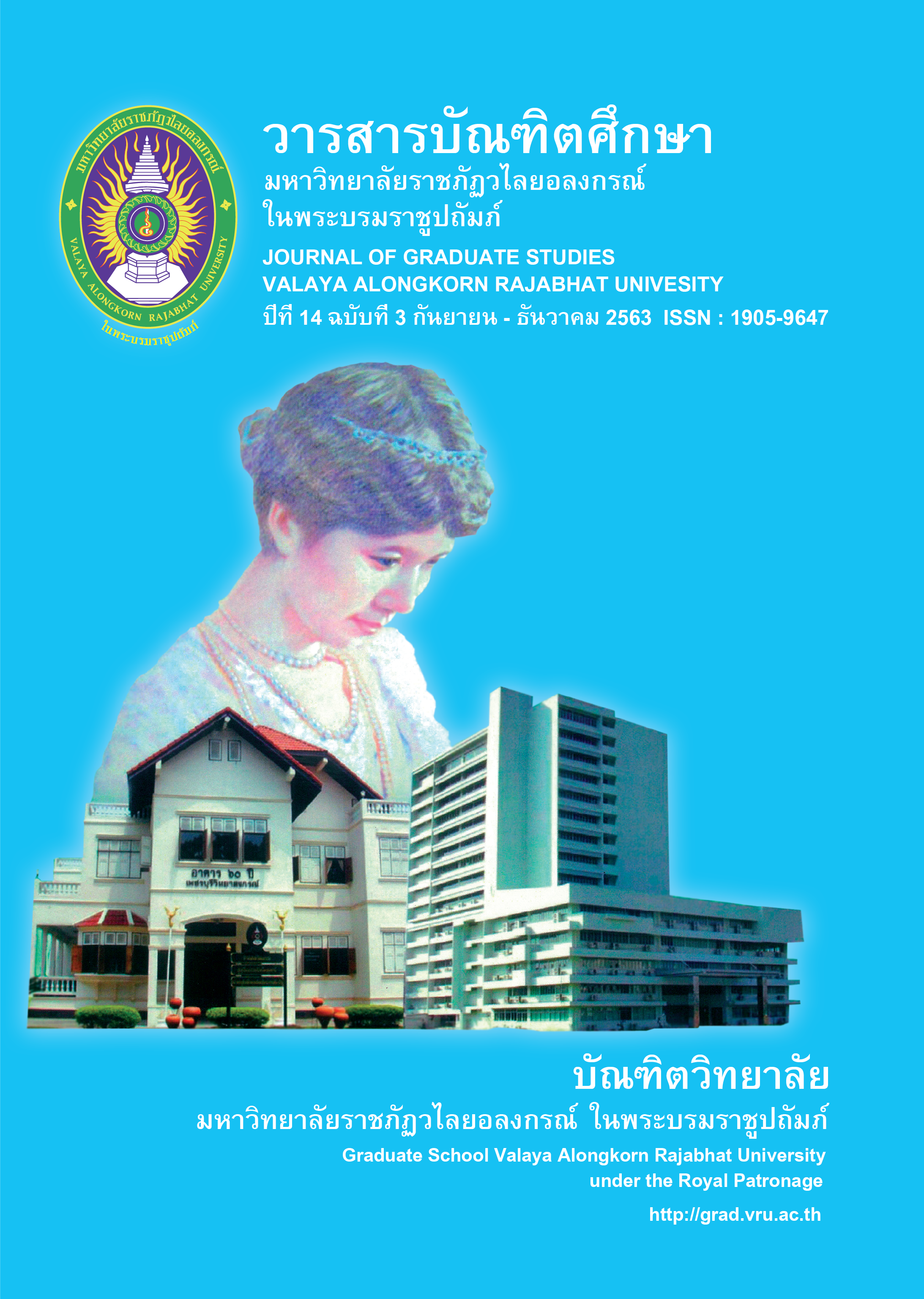EARLY CHILDHOOD CLASSROOM MANAGEMENT IN 21st CENTURY
Main Article Content
Abstract
Nowadays, the society has changed rapidly based on the advancement of science and technology. People’s lifestyle is full of rush in order to fit in the present society; as a result, a paradigm on early childhood development in the social, economic, and cultural dimensions might have been shifted to be suitable for lifestyle in 21st Century. Therefore, to enhance early childhood education to develop young learners to live their lives properly in the present world becomes crucial for stakeholders who make an attempt to ensure that the early childhood educational management nowadays would serve the concepts and the goals which are developing the children properly in every aspect: physically, mentally, socially, and intellectually. That can be seen as quite a challenge for parents, teachers, and caretakers at child development centers for designing learning process that would respond to a child's development, as well as, interest in order that the children would be prepared to live in the rapidly changing society. Early childhood is considered the most important period for personality and brain development; hence, learning management for children in this period is different from other periods, especially, classroom management which affects a child's learning management. That is because classroom management involves preparing a physical atmosphere of a classroom, materials, and activities, including behavior modification in order to maintain the positive learning environment, to help a teacher manage learning better, and to gain participation from learners. Based on a number of hours a child spends in, A classroom can, as a result, be considered the second home for them and has a good influence to cultivate desirable characteristics such as self-confidence, cooperative skills, avidity for learning, responsibility, and critical thinking. To conclude, classroom management is the process of managing a class to be an efficiently class, and as a result, to truly be effective for learners.
Article Details

This work is licensed under a Creative Commons Attribution-NonCommercial-NoDerivatives 4.0 International License.
บทความทุกเรื่องได้รับการตรวจความถูกต้องทางวิชาการโดยผู้ทรงคุณวุฒิ ทรรศนะและข้อคิดเห็นในบทความ Journal of Global of Perspectives in Humanities and Social Sciences (J-GPHSS) มิใช่เป็นทรรศนะและความคิดของผู้จัดทำจึงมิใช่ความรับผิดชอบของบัณฑิตวิทยาลัย มหาวิทยาลัยราชภัฏวไลยอลงกรณ์ ในพระบรมราชูปถัมภ์ กองบรรณาธิการไม่สงวนสิทธิ์การคัดลอก แต่ให้อ้างอิงแหล่งที่มา
References
Bhulpat, C., Suwanmonkha, S., & Kulapichitr, U. (2004). nǣothāng kānčhatkān chan rīan phư̄a dek pathommawai [Guidelines classroom management for early childhood]. Department of Curriculum and Instruction and Education Technology, Faculty of Education: Chulalongkorn University.
Boonpirom, S. (2014), kānbō̜rihān čhatkān nai hō̜ng rīan. [Classroom management]. 1st ed. Bangkok: Triple.
Chatayapha, P. (2017). kān khit wičhāranayān khō̜ng naksưksā sākhā wichākān sưksā pathommawai dōi kānčhatkān rīanrū dōi chai panhā pen thān [Development of Critical Thinking of Students in Early Childhood Education By managing learning by using problems as a base]. Journal of Graduate Studies Valaya Alongkorn Rajabhat University under Royal Patronage. 11(3), 119-131
Choolers, P., & Katewongsa, P. (2016). prasitthiphon khō̜ng tonbǣp kānlot phrưttikam nư̄ai ning læ phrưttikam nā čhō̜ nai wairun [The effectiveness of sedentary behavior and screen-time behavior reduction model for adolescents]. Academic Journal Bangkokthonburi University. 6(2), 124-137.
Dachakupt, Y. (1999). kānbō̜rihān læ kān nithēt kānsưksā pathommawai [Administration and Supervision of Early Childhood Education]. Bangkok: Choaphraya Printing House.
Holadah, A. (2005). rāingān kānwičhai rư̄ang kānwičhai læ phatthanā khwām phrō̜m nai kānčhatkān sưksā pathommawai khō̜ng ʻongkān bō̜rihānsūantambon [Research report subject Research and development of readiness in early childhood education management Of Subdistrict Administration Organization]. Department of Education Sukhothai Thammathirat Open University: Nonthaburi.
Kilenthong, W. (2017). saphāwa kānsưksā Thai pī sō̜ngphanhārō̜ihāsippǣt / sō̜ngphanhārō̜ihāsipkāo khwām čhampen khō̜ng kān khǣngkhan læ kārok ra čhā yaʻam nā čhō̜ nai rabop kānsưksā Thai [Thai educational conditions 2015-2016: The necessity of competition and decentralization in the Thai education system]. Bangkok: Century.
Klaisang, J. (2017). kānphalit læ chai sư̄ yāng pen rabop phư̄a kānrīanrū nai satawat thī yīsipʻet [Systematic production and use of media for learning in the 21th century]. 1st ed. Bangkok: Chulalongkorn University Press.
Kuntirangkul, S. (2008). kānčhatkān chan rīan mư̄ʻāchīp [Classroom Management of Professional Teacher]. Journal Loie Rajabhat University. 1(2), 20-27.
Nilvichien, H. (1992). pathommawai sưksā : laksūt læ nǣo patibat [Early Childhood: Curriculum and Guidelines]. 1st ed. Bangkok: Odeon Store.
Punyarit, W. (1999). kānčhat saphāpwǣtlō̜m nai sathān sưksā dek pathommawai [Organizing the environment in Early Childhood School]. Faculty of Education Phranakorn Rajabhat University. Bangkok: Phranakorn Rajabhat University.
Raksakulthai, et al., (2011). sutyō̜t theknik kānčhatkān rīanrū bǣp khrū mư̄ʻāchīp [The best learning management techniques for professional teachers]. Bangkok: Happy Learning.
The Secretariat of the Senate. (2017). ratthammanūn hǣng rātchaʻānāčhak Thai Phutthasakkarāt sō̜ngphanhārō̜ihoksip [Constitution of the Kingdom of Thailand B.E. 2560]. Bangkok: Secretariat of the House of Representatives Publisher.
Yimyong, S. (2001). kānsưksā kānčhat prasopkān radap ʻanubān sưksā khō̜ng khrū pathommawai čhangwat Pathum Thānī [A study preschool educational experience organizing of early childhood teachers in Pathumthani Province]. Thesis, Master of Education, Early Childhood Education Srinakharinwirot University Prasarnmit.


